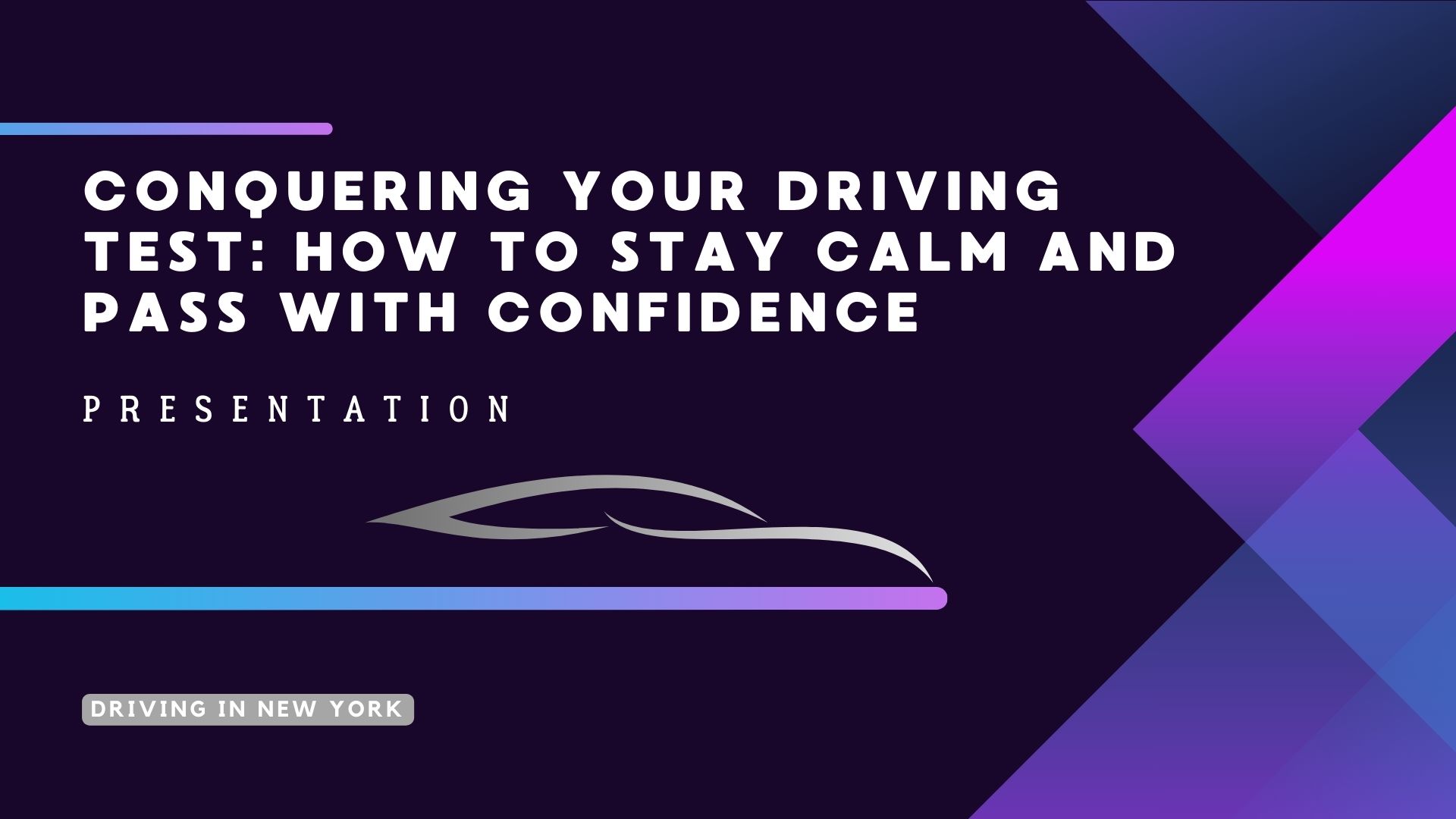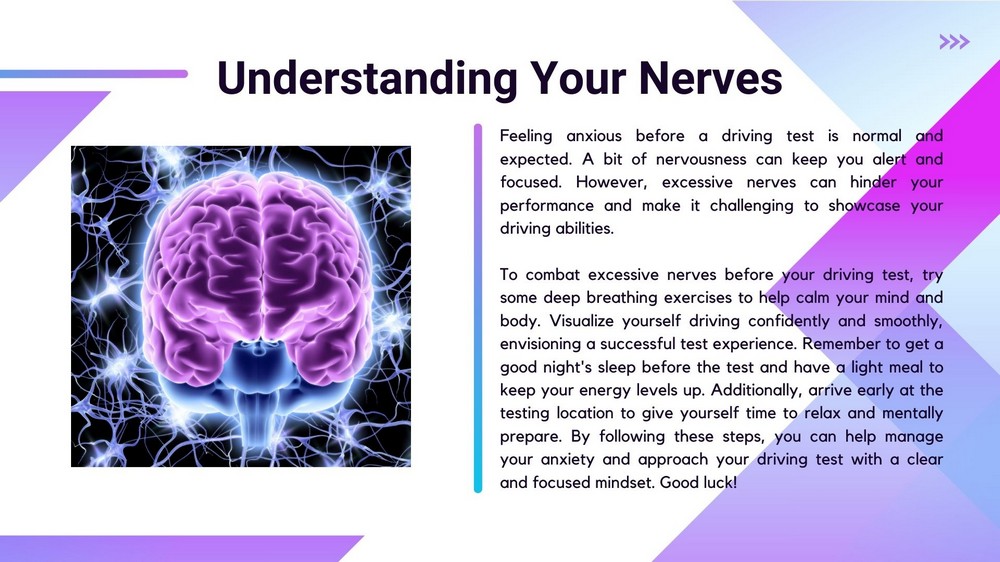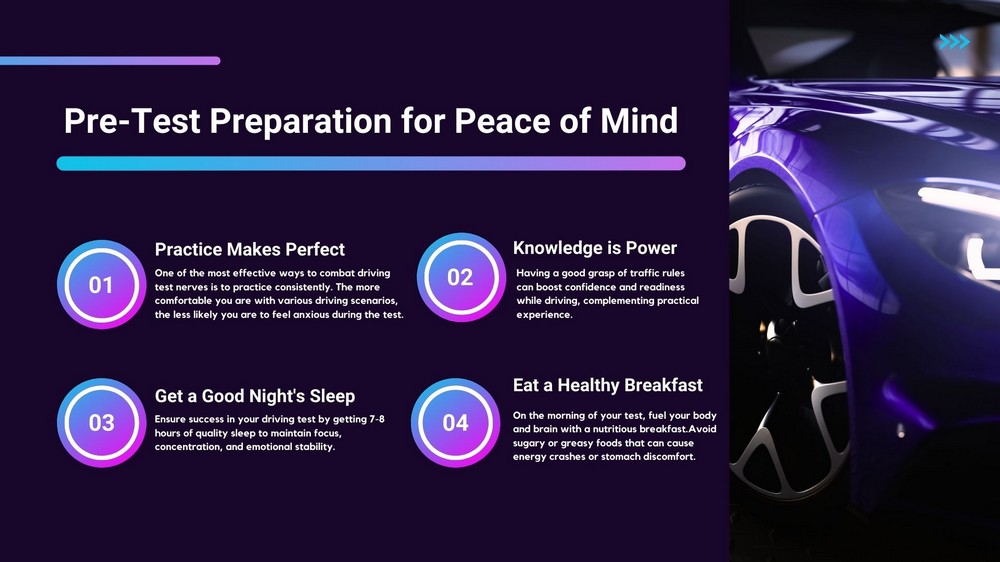Conquering Your Driving Test: How to Stay Calm and Pass with Confidence

Table of Contents
Palms sweating, heart racing, mind spinning with worst-case scenarios - sound familiar? If you're preparing for your driving test, these sensations might be all too real. But don't let driving test nerves get the best of you! With the right strategies and mindset, you can conquer your anxiety and pass your test with flying colors.
Compare prices and availability when you need to rent a car for driving test in Brooklyn.
In this article, we'll dive into the world of driving test jitters and explore proven techniques to help you stay calm, focused, and confident behind the wheel. From mastering deep breathing exercises to harnessing the power of positive self-talk, we've got you covered. Get ready to transform your test day butterflies into driving zen!
Here's a sneak peek at the strategies we'll cover:
|
Pre-Test Preparation |
Test Day Techniques |
|
Practice Makes Perfect |
Deep Breathing Exercises |
|
Knowledge is Power |
Positive Self-Talk |
|
Get a Good Night's Sleep |
Visualization |
|
Eat a Healthy Breakfast |
Additional Tips for Success |
Whether you're a first-time test-taker or you've had a few unsuccessful attempts, this guide will provide you with the tools and insights you need to conquer your driving test anxiety once and for all. So buckle up, take a deep breath, and let's get started on your journey to becoming a licensed driver!
Call Us Today 6AM-10PM
Or fill out the form 24/7
Our team is here to guide you with promotions, instructor availability, and the best training package for you.
Understanding Your Nerves

Before we dive into the strategies to calm your nerves, let's take a moment to understand what's happening in your body and mind when you experience driving test anxiety.
When you're nervous, your body activates the fight-or-flight response, releasing stress hormones like cortisol and adrenaline. This can lead to physical symptoms such as:
- Sweaty palms
- Rapid heartbeat
- Shallow breathing
- Muscle tension
- Upset stomach
On a psychological level, test anxiety can cause:
- Racing thoughts
- Difficulty concentrating
- Self-doubt
- Fear of failure
It's crucial to remember that feeling nervous before a driving test is completely normal and even expected. In fact, a little bit of nervousness can actually help you stay alert and focused. However, when nerves become excessive, they can impair your performance and make it harder to demonstrate your driving skills.
The Impact of Excessive Nervousness on Driving Test Performance
When driving test nerves take over, they can negatively impact your performance in several ways:
|
Impact |
Description |
|
Impaired decision-making |
Anxiety can cloud your judgment and make it harder to make quick, accurate decisions on the road. |
|
Reduced concentration |
Nerves can cause your mind to wander, making it difficult to focus on the task at hand. |
|
Physical tension |
Tense muscles can lead to jerky movements and over-correction while driving. |
|
Increased mistakes |
When you're overly anxious, you're more likely to make errors you wouldn't normally make. |
By understanding the effects of nerves on your mind and body, you can start to develop strategies to counteract them. In the following sections, we'll explore practical techniques to help you stay calm and confident during your driving test, so you can showcase your skills and pass with flying colors.
Call Us Today 6AM-10PM
Or fill out the form 24/7
Our team is here to guide you with promotions, instructor availability, and the best training package for you.
Pre-Test Preparation for Peace of Mind

Now that we've explored the nature of driving test nerves, let's dive into some proactive strategies you can use to calm your anxiety before the big day. By preparing thoroughly, you'll feel more confident and in control when it's time to get behind the wheel.
Practice Makes Perfect
One of the most effective ways to combat driving test nerves is to practice consistently. The more comfortable you are with various driving scenarios, the less likely you are to feel anxious during the test. Here are some tips for effective practice:
- Schedule regular practice sessions with your driving instructor or a licensed driver
- Practice in a variety of conditions (e.g., daytime, nighttime, different weather conditions)
- Focus on mastering common driving maneuvers that may be included in the test, such as parallel parking, three-point turns, and lane changes
Remember, the more you practice, the more confident you'll feel on test day!
Knowledge is Power
In addition to practical experience, a thorough understanding of traffic rules and regulations can help ease your nerves. When you know what to expect and how to handle various situations, you'll feel more prepared and self-assured. To boost your knowledge:
- Study your state's driver's manual thoroughly
- Take online practice tests to gauge your understanding
- Familiarize yourself with the test route and potential challenges you may encounter
Get a Good Night's Sleep
Adequate sleep is crucial for maintaining focus, concentration, and emotional stability - all of which are essential for a successful driving test. Aim to get 7-8 hours of quality sleep the night before your test to ensure you're well-rested and ready to perform at your best.
Eat a Healthy Breakfast
On the morning of your test, fuel your body and brain with a nutritious breakfast. Opt for foods that provide sustained energy and promote mental clarity, such as:
- Whole-grain cereals or toast
- Fresh fruits
- Eggs
- Yogurt
- Nuts and seeds
Avoid sugary or greasy foods that can cause energy crashes or stomach discomfort.
By implementing these pre-test preparation strategies, you'll be well on your way to conquering your driving test anxiety and approaching the big day with confidence and peace of mind.
Calming Techniques on Test Day
Even with thorough preparation, it's normal to experience some nerves on the day of your driving test. To help you stay calm and focused, let's explore some effective techniques you can use during the test itself.
Deep Breathing Exercises
Deep breathing is a powerful tool for reducing anxiety and promoting relaxation. When you're feeling nervous, take a moment to practice this simple exercise:
- Inhale slowly and deeply through your nose for a count of four
- Hold your breath for a count of four
- Exhale slowly through your mouth for a count of four
- Repeat for several rounds until you feel more calm and centered
Deep breathing helps to lower your heart rate, reduce muscle tension, and clear your mind, allowing you to focus on the task at hand.
Positive Self-Talk
The way you talk to yourself can have a significant impact on your confidence and performance. Instead of dwelling on worst-case scenarios or self-doubt, try to cultivate positive self-talk. Some examples include:
- "I am well-prepared and capable of passing this test."
- "I have practiced extensively and know what to do."
- "I will stay focused and take the test one step at a time."
Repeat these affirmations to yourself before and during the test to boost your self-assurance.
Visualization
Visualization is a mental rehearsal technique that can help calm your nerves and increase your confidence. Close your eyes and imagine yourself:
- Approaching the test with a calm and positive attitude
- Executing each driving maneuver smoothly and confidently
- Receiving positive feedback from the examiner
- Passing the test with flying colors
By visualizing success, you train your mind to expect positive outcomes and perform at your best.
|
Technique |
Benefits |
|
Deep Breathing |
Reduces anxiety, lowers heart rate, promotes relaxation |
|
Positive Self-Talk |
Boosts confidence, counters negative thoughts |
|
Visualization |
Mentally rehearses success, increases self-assurance |
Remember, these techniques are tools you can use anytime you feel your driving test nerves starting to take over. With practice, you'll become more adept at calming your anxiety and focusing on the present moment, allowing your driving skills to shine through.
Additional Tips for Success
In addition to the calming techniques we've covered, there are several more strategies you can use to set yourself up for success on test day. Let's explore some additional tips to help you conquer your driving test anxiety.
Arrive Early
Arriving at the test location early can help reduce stress and give you time to collect yourself before the test begins. Plan to arrive at least 15-20 minutes before your scheduled time to allow for any unexpected delays and to give yourself a buffer to relax and focus.
Use the Bathroom
It may seem like a small detail, but making sure to use the restroom before your test can help eliminate distractions and improve your concentration. You don't want to be halfway through the test and realize you need to go!
Listen to Calming Music
If you find music helpful for relaxation, consider creating a calming playlist to listen to on your way to the test location. Choose songs with a slow tempo and soothing melodies to help quiet your mind and reduce anxiety.
Communicate with Your Examiner
Remember, your examiner is not there to trick you or catch you out. If you have any questions or need clarification during the test, don't hesitate to ask. Clear communication can help alleviate uncertainty and keep you focused on the task at hand.
Focus on the Present Moment
During the test, it's essential to stay focused on the present and avoid dwelling on potential mistakes or future outcomes. If you find your mind wandering, gently bring your attention back to the current moment and the specific action you're performing.
Remember, It's Not the End of the World
Finally, it's crucial to keep perspective. While passing your driving test is an important milestone, remember that it's not the end of the world if you don't succeed on your first attempt. Many people need multiple tries to pass, and each attempt is an opportunity to learn and improve.
|
Tip |
Benefit |
|
Arrive Early |
Reduces last-minute stress, allows time to relax |
|
Use the Bathroom |
Eliminates distractions, improves concentration |
|
Listen to Calming Music |
Promotes relaxation, reduces anxiety |
|
Communicate with Your Examiner |
Alleviates uncertainty, maintains focus |
|
Focus on the Present Moment |
Avoids dwelling on mistakes or future outcomes |
|
Remember, It's Not the End of the World |
Maintains perspective, reduces pressure |
By incorporating these additional strategies alongside the calming techniques and pre-test preparation we've discussed, you'll be well-equipped to manage your driving test nerves and approach the test with confidence and poise.
Embracing Calm and Confidence on Your Road to Driving Success
Throughout this article, we've explored the world of driving test nerves and discovered a wealth of strategies to help you stay calm, focused, and self-assured as you approach this important milestone.
We began by understanding the physiological and psychological impact of test anxiety, normalizing the experience of nervousness, and recognizing how excessive nerves can impair performance. Armed with this knowledge, we delved into proactive pre-test preparation techniques, such as consistent practice, thorough studying, adequate sleep, and a nutritious breakfast, to help you feel confident and in control.
Next, we explored powerful calming techniques you can employ on test day itself, including deep breathing exercises, positive self-talk, and visualization. These tools can help you manage anxiety in the moment, maintain focus, and tap into your innate driving abilities.
Finally, we discussed additional tips for success, such as arriving early, using the restroom, listening to calming music, communicating with your examiner, focusing on the present moment, and keeping a healthy perspective. By incorporating these strategies alongside the others we've covered, you'll be well-prepared to conquer your driving test anxiety and approach the test with poise and self-assurance.
Remember, learning to manage nerves is a skill that extends far beyond the driving test. By developing these techniques and cultivating a calm, confident mindset, you're laying the foundation for success not just on the road, but in all areas of your life.
So take a deep breath, trust in your preparation, and know that you have what it takes to overcome your driving test nerves and emerge victorious. Embrace the journey, stay focused on your goals, and soon enough, you'll be holding that hard-earned driver's license in your hands.

Call Us Today 6AM-10PM
Or fill out the form 24/7
Our team is here to guide you with promotions, instructor availability, and the best training package for you.
Frequently Asked Questions
-
What if I make a mistake during the test?
Making a minor mistake during your driving test doesn't necessarily mean you'll fail. The examiner understands that nerves can impact performance, and they're looking for your overall ability to drive safely and confidently. If you make a small error, take a deep breath, refocus, and continue with the test to the best of your ability.
-
Can I bring a supportive friend or family member to the test?
While it's natural to want moral support, most states don't allow friends or family members to ride along during the actual driving test. However, you can arrange for someone to drive you to the test location and wait for you until you're finished. Knowing you have a supportive presence nearby can help ease your nerves.
-
How many times can I take the driving test if I don't pass the first time?
The number of times you can retake the driving test varies by state, but most allow you to retake the test after a specified waiting period (usually a few weeks). There may be additional fees for retaking the test. Remember, each attempt is an opportunity to learn and improve, so don't be discouraged if you don't pass on the first try.
-
What should I do if I start to feel anxious during the test?
If you feel your nerves starting to take over during the test, employ the calming techniques we discussed earlier. Take a few deep breaths, engage in positive self-talk, and refocus your attention on the present moment. If you need a moment to collect yourself, you can ask the examiner for a brief pause before continuing.
-
How can I continue to manage my nerves after passing the test?
Passing your driving test is a significant accomplishment, but it's normal to still feel some nerves as a new driver. To continue managing your anxiety, practice the calming techniques you learned and gradually expose yourself to more challenging driving situations. Build your confidence by driving with a supportive friend or family member, and remember to celebrate your progress along the way.
-
What if I need to reschedule my driving test due to nerves or other circumstances?
If you feel overwhelmed or unprepared leading up to your scheduled driving test, it's okay to reschedule. Contact your local DMV or testing center to inquire about their rescheduling policy and any associated fees. It's better to postpone the test and give yourself more time to prepare than to go in feeling overly anxious and risk underperforming.
-
Can I request a specific examiner for my driving test?
In most cases, you cannot request a specific examiner for your driving test. Examiners are assigned based on availability and scheduling. However, remember that all examiners are trained professionals whose goal is to ensure you can drive safely, not to trick you or make you fail.
-
What if I have a panic attack or freeze up during the test?
If you experience a panic attack or freeze up during the test, alert your examiner immediately. They are trained to handle these situations and will guide you to a safe place to pull over and collect yourself. Remember, your safety and well-being are the top priorities. If necessary, you may need to reschedule the test for another day when you feel more prepared and confident.
I hope these answers provide clarity on important defensive driving topics. Let me know if you have any other questions!
 English
English Spanish
Spanish 

